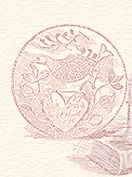Ihr liewe
Leit:
Ya, wie gsaat, manniche vun denne friehe Kallem Schreiwer – wie,
zum Beischpiel, der von Nieda – hen viel zu viel Englisch benutzt. Awwer es
scheint ass sie gut Deitsch schwetze hen kenne; dann un wann hen sie deitsche
Wadde benutzt ass sie gaar nix devun gewisst hedde, hedde sie net zimmlich
viel vun der Mudderschprooch gewisst. Iss es meeglsich ass sie so viel
englische Wadde benutzt hen yuscht (nee, sell is net en englisch Watt, awwer
en gans alt deitsch Watt) weil ihre Leser ihre Deitsch mit viel Englisch
gepeffert hen?
Wann mer iwwer deitsche Dinger schwetze will, do brauch mer ken
Englisch benutze – wennichdens net viel. Der Kaspar Hufnagel (Pierce E. Swope,
1884-1968) hot mol en Kallem in der Lebanon Daily News ghatt. Wie ihr gude
Leser nau (nee, sell iss kee englsich Watt, awwer en gans alt deitsch Watt)
sehne kennt, hot fascht kee Englisch benutzt:
Wie ich en Bu waar, hen die Bauersleit schier all groose Familye
ghatt. Es waare fimf Buwe un drei Meed in unsere Family. Es waar Aerwet uff
der Bauerei fer all vun uns Buwe. Die glennschde hen die Oier gsucht, Vieh
gedriwwe,un Wasser naus ins Feld gedraage, so ass die Schaffleit drinke hen
kenne.
Wie die Buwe wennich greeser waare, hen sie Aerwet grickt ass meh
Grefde genumme hot. Mir hen die Schtell ausgemischt, Geil gschtriggelt un hen
aa als die Geil zum Schmidt geridde.
Glei noch sellem hen mir en Mannsaerwet geduh. Ich weess noch wie
ich lanne hab eege un bluuge. Mir hen en Leingaul ghatt, un den hen mer
gfaahre an re Zopplein. Sell iss net so gut gange fer en Weil.
Die hattscht Aerwet waar mischt laade un Poschdelecher graawe. Nau,
die menschde Buwe hen and der Aerwet halde misse. Der Daadi waar net grobb zu
uns. Er hot immer mitgschafft. Awwer wann mer zu viel rumgschtanne hen un nuff
and ie Sunn geguckt, hot er als gsaat, “Buwe, halt eich draa!
Drauss uff der Bauerei hen mir en groosi Scheier ghatt. Des waar en
Schweitzer Scheier, mit me Scheierbrick am hinnere End. Datt iss mer nuff uff
der zwett Schtock. Am yedem End vun der Scheier waare Hoibarre, der Blatz wu
mer Hoi neigepackt hot in der Hoiet Deel waar Dimmedihoi, es anne waar Gleehoi.
Nau, wie ihr sehnt, der Kaspar hot net viel Englisch benutzt, gell?
Familye, Lein, drinke sin net englische Wadde! Neddemol Englisch iss Englisch!
Dimmedi? Ya, ihr habt’s gerode; Dimmedi iss Englisch.
Un nee, End iss net Englisch end.
Macht’s gut,
Der Alt Professer
|
Dear people:
Yes, as we have been saying, many of the early column writers – as,
for example, von Nieda – used much too much English. But it seems that
they could speak good Pennsylvania German; now and then they used German
words that they would not have known anything about, had they not known
quite a bit about the Mother Tongue. Is it possible that they used so many
English Words just (no, that is not an English word, but a very old German
word) because their readers peppered their PG with a lot of English?
If you want to talk about PG things, you don’t have to use English
– at least not much. Kaspar Hufnagel (actually Pastor Pierce E. Swope,
1884-1968) once wrote a column for the Lebanon Daily News. As you good
readers know (no, that is not an English word, but a very old German word)
can see, Kaspar used hardly any English:
When I was a boy, the farmers almost all had large families. There
was work on the farm for all of us boys. The smallest looked for the eggs,
drove the cattle, and carried water out to the field so that the workers
could drink.
When the boys were a little bigger, they got work that took more
strength. We took the manure out of the barn, curried the horses, and also
sometimes rode the horses to the blacksmith.
Right after that we did man’s work. I still remember learning to
harrow and plow. We had a line horse, and we guided it with a check line.
That didn’t go so well for a time.
The hardest work was loading manure and digging post holes. Now,
most of the boys had to stick to their work. Daddy wasn’t rough with us.
He always helped along. But if we stood around too much and looked up at
the sun, he used to say. “Boys, stick to your work!”
Out on the farm we had a big barn. It was a Swiss (that is, a bank)
barn, with a “barn bridge” at the back end. There we went up to the second
floor. At each end of the barn were hay mows, the place where we packed in
hay during the haying time. Some of it was timothy hay, the other was
clover hay.
Now, as you see, Kaspar didn’t use much English, right? Familye,
Lein, drinke are not English words! Not even Englisch is English! Dimmedi?
You guessed it; Dimmedi is English timothy.
And no, End is not English end.
Take care,
The Old Professor
|













